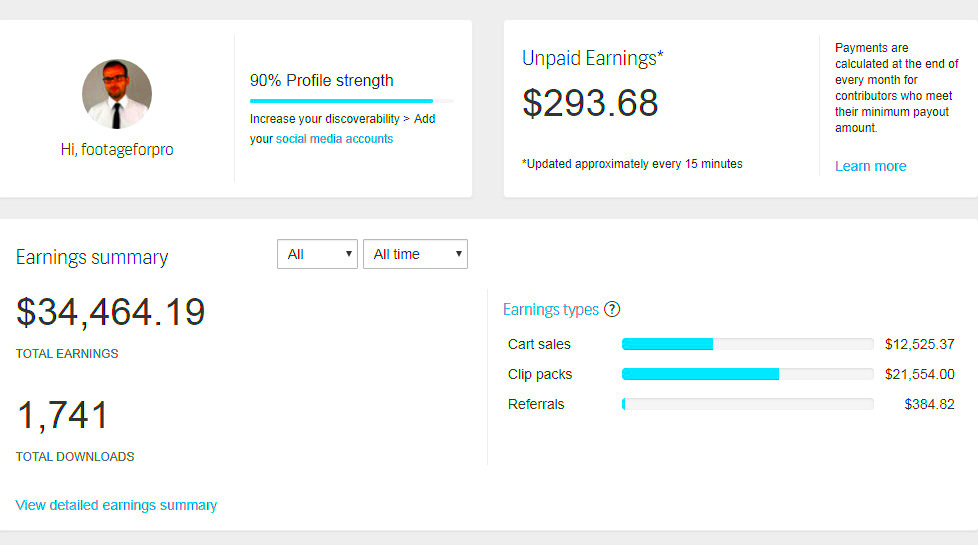Shutterstock is a popular marketplace for stock images, videos, and music. It allows creators to sell their work to a global audience. As a contributor, you can earn money each time someone downloads your images. The platform is user-friendly, making it easy to navigate for both buyers and sellers. You’ll find various resources available to help you succeed, including guidelines on the types of content that sell best and tips on optimizing your portfolio. Understanding the platform is crucial for maximizing your earnings.
How to Create High-Quality Images

Creating high-quality images is key to attracting buyers on Shutterstock. Here are some tips to keep in mind:
- Use Good Equipment: Invest in a decent camera and lens. A DSLR or mirrorless camera can help you achieve better results.
- Pay Attention to Lighting: Natural light works wonders. Aim for early morning or late afternoon when the light is soft.
- Focus on Composition: Use the rule of thirds to create visually appealing images. Ensure the subject is well-placed within the frame.
- Post-Processing: Edit your photos to enhance colors and sharpness. Software like Adobe Lightroom or Photoshop can help.
- Stay on Trend: Keep an eye on current trends in photography. This can guide you in capturing what buyers are looking for.
By creating stunning images, you'll stand out among the thousands of contributors and attract more downloads.
Also Read This: How to Edit Adobe Stock Templates in Photoshop
Setting Up Your Contributor Account

Getting started on Shutterstock as a contributor is straightforward. Here’s how to set up your account:
- Visit the Shutterstock Contributor Page: Go to the Shutterstock website and click on the contributor section.
- Sign Up: Fill out the registration form with your personal information. Make sure to use a valid email address.
- Agree to the Terms: Read through Shutterstock's terms and conditions. It's essential to understand the rules of the platform.
- Upload Samples: Before your account is approved, you need to submit a few sample images. This helps Shutterstock assess your work quality.
- Wait for Approval: Shutterstock will review your samples. Once approved, you can start uploading your portfolio.
Having a well-organized contributor account will set you up for success on the platform. Remember to keep your profile updated and showcase your best work.
Also Read This: How to Send Disappearing Photos on Telegram
Navigating the Upload Process

Uploading your images to Shutterstock is a crucial step in becoming a successful contributor. The process is straightforward, but it's important to follow certain guidelines to ensure your images get approved. Here’s a step-by-step guide to help you navigate through it:
- Log Into Your Contributor Account: Start by signing in to your Shutterstock contributor account.
- Access the Upload Section: Once logged in, find the "Upload" button on your dashboard. This is where you'll begin.
- Select Your Files: You can upload multiple images at once. Choose the best images from your collection and click to upload.
- Fill in Metadata: For each image, add relevant titles, descriptions, and keywords. This information helps potential buyers find your work. Use descriptive words that capture the essence of the image.
- Review and Submit: Double-check your submissions for any errors. Once you’re satisfied, hit the “Submit” button. Your images will be sent for review.
Remember, patience is key! It can take some time for Shutterstock to review and approve your images, but following these steps will ensure a smooth process.
Also Read This: How to Stop Shutterstock Ads on YouTube for a Better Viewing Experience
Optimizing Your Images for Search
To increase your chances of making sales on Shutterstock, optimizing your images for search is essential. Here are some strategies to help your work stand out:
- Use Relevant Keywords: Choose keywords that accurately describe your images. Think about what potential buyers might search for.
- Write Descriptive Titles: Create clear and concise titles that summarize the image content. This helps in search results.
- Add Detailed Descriptions: A well-written description adds context to your images. Explain the subject and setting to attract buyers.
- Tag Your Images Effectively: Use tags wisely to improve visibility. Include synonyms and variations of your main keywords.
- Analyze Trends: Keep an eye on popular searches and trends. This knowledge can guide you in creating content that meets market demands.
By implementing these optimization techniques, you can increase the likelihood of your images being discovered by potential buyers, leading to more sales.
Also Read This: How to Create a Beautiful Jewellery Box Using Ice Cream Sticks
Promoting Your Shutterstock Portfolio
Once you’ve uploaded your images, promoting your Shutterstock portfolio becomes crucial for driving traffic and increasing sales. Here are some effective strategies to consider:
- Utilize Social Media: Share your work on platforms like Instagram, Facebook, and Pinterest. Use relevant hashtags to reach a wider audience.
- Create a Personal Website: Having a dedicated website can showcase your portfolio. Include links to your Shutterstock account so visitors can easily purchase your images.
- Engage with Photography Communities: Join online forums and groups related to photography. Share your insights and promote your portfolio subtly without being too pushy.
- Write a Blog: Start a blog about your photography journey, tips, and experiences. This can drive organic traffic to your portfolio.
- Collaborate with Other Creatives: Partner with other photographers or artists for cross-promotion. This can help you reach new audiences.
Promotion takes time and effort, but it’s essential for maximizing your earnings on Shutterstock. Consistency and creativity in your marketing efforts can lead to greater visibility and success.
Also Read This: Exploring How Much You Can Make from Shutterstock Contributions
Tracking Your Sales and Earnings
Keeping an eye on your sales and earnings is vital for understanding how well your images are performing on Shutterstock. The platform provides several tools to help you track your progress. Here’s how to effectively monitor your sales:
- Access Your Dashboard: Log in to your Shutterstock contributor account and go to your dashboard. This is where you'll find all the essential information about your sales.
- Review Your Sales Reports: Shutterstock offers detailed sales reports. These reports break down your earnings by image and show you which ones are your top sellers.
- Check Your Earnings Trends: Look for trends in your earnings over time. Are there specific months when sales spike? This data can help you plan future uploads.
- Use Analytics Tools: Take advantage of any analytics tools Shutterstock provides. These can give you insights into which keywords or categories are bringing in the most traffic.
- Set Financial Goals: Based on your sales data, set realistic financial goals. This can motivate you to create and upload more content.
By tracking your sales and earnings, you can make informed decisions about your photography and find ways to boost your income on Shutterstock.
Also Read This: How to Access the New YouTube Layout and Understand Its Changes
Frequently Asked Questions
As a Shutterstock contributor, you may have some questions about the platform. Here are a few common queries and their answers:
- How much can I earn on Shutterstock?
- Earnings vary depending on the number of downloads and the type of license purchased. Generally, you can earn between 15% to 40% of the sale price.
- What types of images sell best?
- Images that are unique, high-quality, and meet current trends tend to sell better. Subjects like lifestyle, business, and technology are often in demand.
- Can I submit the same images to other platforms?
- Yes, you can submit your images to multiple stock platforms, as long as they are not exclusive to Shutterstock.
- How often should I upload new images?
- Regular uploads can help maintain visibility. Aim to add new content consistently, such as weekly or monthly.
- What happens if my images get rejected?
- If your images are rejected, review the feedback from Shutterstock. Use this information to improve your future submissions.
Conclusion
Becoming a successful contributor on Shutterstock requires dedication, creativity, and a willingness to learn. By understanding the platform, creating high-quality images, and effectively promoting your portfolio, you can maximize your earnings. Remember to track your sales and adapt your strategy based on your performance. As you gain experience and refine your skills, you'll find more opportunities to grow your income. So, start taking action today, and enjoy the journey of being a Shutterstock contributor!
